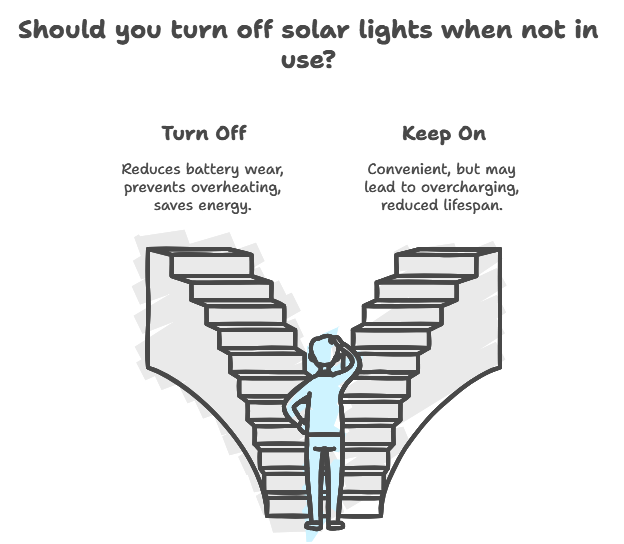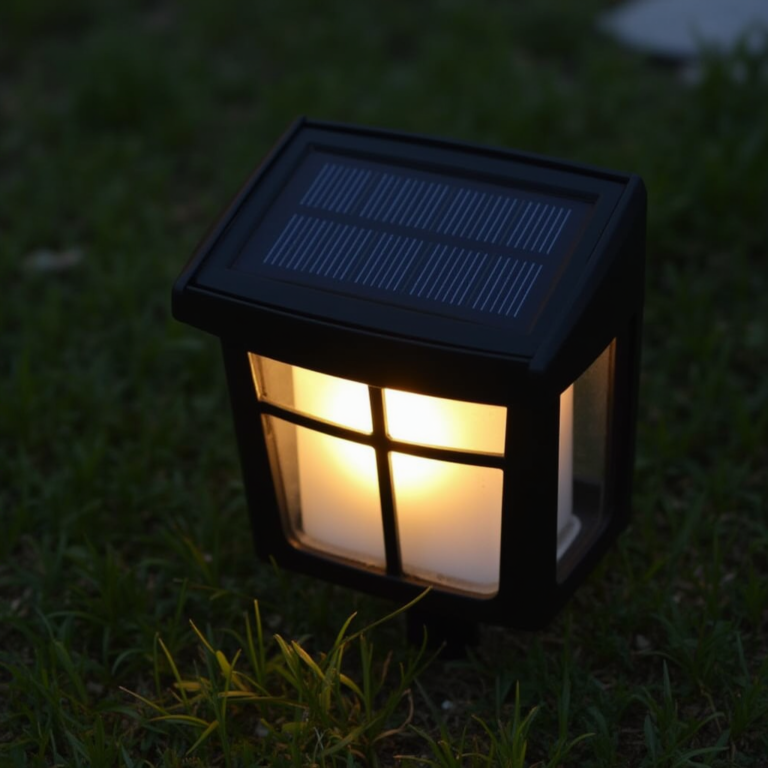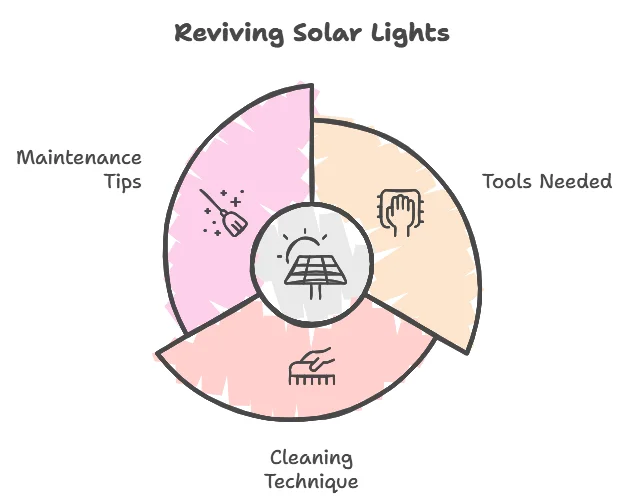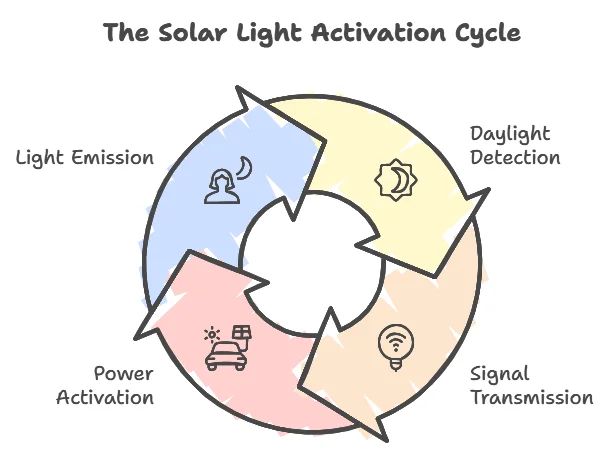DIY repairs and faulty wiring can make almost anything a fire risk if handled improperly.
But what about solar lights? Can they catch fire?
The short answer: yes, they can—though it’s rare and usually preventable with the right steps.
In this guide, I’ll walk you through the potential hazards, show you how to sidestep common mistakes and share essential tips to keep your solar lights safe and shining bright.
Key Takeaways
- Solar lights pose a fire risk primarily from battery malfunctions, inadequate wiring, and low-quality materials.
- Lithium-ion batteries in solar lights are particularly susceptible to fire hazards if not properly managed.
- Improper wiring and amateur repairs can significantly elevate the risk of fires.
- Selecting solar lights made with superior materials and equipped with safety features greatly lowers fire dangers.
- Consistent upkeep, strategic installation, and cautious battery handling are vital for maintaining safe and effective solar lighting.
What Makes Solar Lights a Fire Risk?
1. Battery Hazards: The Heart of Potential Issues

Batteries might look simple on the outside, but inside, they’re like little boxes of intense action with all kinds of chemical reactions happening.
That’s why batteries, especially those used in solar lights, can sometimes be a fire risk.
Let’s talk about lithium-ion batteries.
These are popular in solar lights because they pack a lot of power into a small space.
But they also have some pretty reactive stuff inside them, including a flammable liquid called electrolyte.
If the battery gets damaged and this liquid leaks out, it could catch fire if it hits something flammable, like dry leaves or paper.
There’s also the issue of batteries getting too hot.
If they heat up too much, it can start a chain reaction called thermal runaway, which means the heat keeps building up until it can cause a fire.
This is more likely to happen if the battery sits in the sun too long, gets overcharged, or isn’t made very well.
To keep things safe, the best solar lights come with something called smart controllers.
These clever gadgets keep an eye on how hot the battery is and how much charge it’s holding.
If things start heating up too much or the battery gets too full, these controllers can dial down the power or even turn off the lights to cool things down and prevent any trouble.
2. Wiring Flaws and DIY Fixes Gone Wrong

Remember how in school, we always had to be extra careful with experiments, especially the ones involving electricity?
Well, that same careful approach is super important when you’re messing with the wiring of your solar lights.
If the wiring isn’t done just right, or if someone who isn’t quite sure what they’re doing tries to fix it, it’s not just a small hiccup—you could end up with a serious fire hazard on your hands.
Getting into a DIY project is a lot of fun, and it feels great to fix things on your own.
But when it comes to playing with the wires, you’ve got to watch your step.
Even a little mistake could lead to big, fiery problems.
So, take it slow and ensure you know what you’re doing, or you might be calling for more trouble than you bargained for.
3. Risks of Cheap, Low-Quality Materials

I get why pinching pennies and picking cheaper options might seem like a good idea—everyone loves to save a bit where they can, right?
But here’s a heads-up: when it comes to solar lights, taking the cheapest route can be risky business.
Those budget-friendly models?
They often cut corners on quality.
Usually, they’re made with materials that aren’t exactly tough enough to handle the weather, and they might not be fire-resistant either.
They also tend to miss crucial safety features that keep the power in check and prevent the batteries from overloading.
What this means is that by choosing the cheaper solar lights, you’re upping the chances of running into issues like overheating, or worse, fires.
That’s why I’m all for striking a balance between affordability and quality.
Think about it this way—investing a bit more in solar lights with safety certifications or build guarantees can save you from future headaches.
It’s not just about spending more; it’s about investing wisely to ensure safety and durability.
How to Safeguard Your Solar Lights Against Fire Risks?
1. Choose Reliable, High-Quality Solar Lights

Going for high-quality solar lights is a smart move if you’re looking to cut down on fire risks outside your home.
Yes, they might cost a bit more when you’re checking out, but think of it as an investment in safety.
These lights are made to last, using tough, fire-resistant materials that stand up to all kinds of weather without falling apart or causing the kind of electrical issues that can lead to fires.
Plus, these top-tier lights come with some handy safety features.
We’re talking about things like overcharge protection, systems that keep them from getting too hot, and automatic shutoffs if things start to go sideways.
These aren’t just fancy bells and whistles—they’re crucial for keeping everything running smoothly and safely.
And let’s talk about batteries for a second.
The better the battery, the safer your lights are.
High-quality batteries are built to prevent leaks and overheating and do a great job of holding their charge.
This reduces the risk of them getting overcharged, which is a big deal since that’s a common way fires start with solar lights.
The companies that make these high-quality lights usually stand behind their products with solid warranties and certifications that prove they’re serious about safety and durability.
This isn’t just good marketing; it’s a promise that these lights are built to be safe and last long.
Lastly, it’s not just about how these lights work; it’s also about how they’re designed.
Good solar lights are made not just to look good but to be safe.
They’ve got great heat dissipation, seals that keep water out, and strong electrical connections.
2. Position Lights with Ventilation in Mind

Think about how you don’t shove all your kitchen gadgets together because they might overheat.
Well, placing your solar lights requires a similar kind of thoughtfulness.
It’s all about keeping them cool and out of harm’s way.
Ensure to set them up away from any heat sources like barbecue grills or heating vents, which can make them too hot.
Also, watch out for leaves or debris gathering around the lights.
Stuff like that can trap heat, upping the chance they might overheat.
Finding the right spot for your lights is key.
You want them to soak up enough sunlight to charge during the day, but you don’t want them under the intense midday sun for too long—too much direct heat could harm the batteries.
And think about how close together you place them.
If they’re too snug, they won’t get enough air and will start heating up.
Spacing them out properly lets the air circulate better, keeping them cooler and significantly lowering the risk of them getting too hot or causing a fire.
3. Switch Off Lights When Not in Use

Flipping off your solar lights when you don’t need them might sound trivial, but it’s a game-changer for their longevity.
Even though the chances of them catching fire are slim, turning them off avoids unnecessary battery wear and tear.
What happens when you turn them off?
You’re giving the batteries a little vacation.
This prevents them from getting overcharged or wearing out too soon, which can lead to problems like overheating later on.
It’s kind of like not wanting to overwork yourself to stay sharp; the same goes for your solar lights.
4. Handle Batteries with Care and Dispose of Responsibly

Taking good care of the batteries in your solar lights is crucial for keeping things safe and smooth, especially those tricky lithium-ion ones.
Ensure you follow what the manufacturer says about charging, using, and storing them.
If they get overcharged, too hot, or too cold, they could seriously heat—a problem called thermal runaway that could start a fire.
And when it’s time to part ways with these batteries, don’t just chuck them in the bin.
Throwing lithium-ion batteries into regular trash can hurt the environment and even create a fire hazard at disposal sites.
Instead, it’s way smarter to take them to local recycling spots that know how to properly handle electronics and batteries.
These places help ensure the batteries are disposed of safely, reducing environmental harm and lowering the risk of fires.
5. Check and Maintain Your Solar Lights Regularly

Finally, making a habit of checking on your solar lights every so often is a smart move, just like keeping tabs on other things around the house.
Every few weeks, take a casual walk around your yard and check on how your solar lights are holding up.
It’s a good way to catch any small issues before they grow into bigger problems.
And here’s a quirky trick: try a quick “sniff test” during your check-up.
It might sound odd, but it’s effective. If you pick up a light and notice a burnt plastic smell, it might be time to replace it.
But if it just smells like regular plastic and a bit of dust, everything’s probably fine.
A little routine check like this can help keep your lights running smoothly and avoid any surprises later on.
FAQs
Are Solar Lights a Fire Risk?
Solar lights pose minimal fire risk with quality components and proper care, but low-grade batteries or wiring can increase hazards.
Is It Okay to Leave Solar Lights on All Night?
It’s okay to leave solar lights on all night as they are designed for nighttime use, solar lights perform well left on; switching off when unnecessary extends battery life.
Do Solar Lights Overheat?
Solar lights rarely overheat; quality solar lights regulate temperature, but faulty batteries or extreme heat may cause overheating if unchecked.
How Safe Are Solar Lights?
Solar lights are safe when using certified products; regular maintenance and appropriate setup further reduce any risks.
Conclusion
As promised, we’ve covered the potential fire hazards of solar lights, including battery issues, faulty wiring, and inferior materials.
We’ve also discussed how to reduce these risks through proper maintenance, high-quality materials, and strategic placement.
One unique piece of advice: always use a battery management system (BMS) in your solar lights.
A BMS can monitor and protect your batteries from overcharging and overheating, significantly reducing fire risks.



